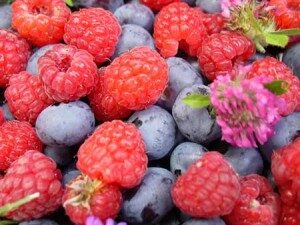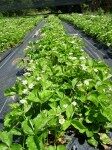By Helen Brody (January 8, 2010)

Roll back the years, to April 22, 1970. The first “Earth Day” was being celebrated around the country. Caroline Saltonstall and Buck Robinson, later to be husband and wife, were participating in different parts of the country in this first environmental “teach in.” Thus begins the tale of these early innovators to help nudge the country, and indeed the world, toward understanding that organic farming was indeed a plausible way to grow crops, and to find ways to reduce farm energy costs.
In the early years, it was Buck who thrust himself professionally into environmental endeavors. In 1972 he opened a bookstore in a restored bank building in Rockport MA that continues to devote all profits to environmental causes. His next endeavor was to found a company that focused on the sale of solar panels and other alternative fuel equipment, including wind turbines, wood stoves and multi-fuel boilers.
Meanwhile, Caroline and Buck married and had two children. Caroline finished her doctorate in education at Harvard and launched a career as a graphic designer of educational materials, remaining in the environmental movement through her work with Buck on the Academy Award winning film, Lovins on the Soft Path, a documentary about the energy expert Amory Lovins.
By 1992, however, the couple was ready to jump into farming with both feet by purchasing the family farm in Stratham New Hamsphire from Caroline’s parents. After searching throughout Rockingham County, they could find only a single organic berry farm – and it was growing only strawberries. They embarked with Caroline’s parents, Dr. Henry and Mrs. Cecilia Saltonstall, on the creation of an organic pick-your-own berry farm of four acres.
They decided that planting a greater variety of berries, including blueberries. raspberries, blackberries and black raspberries, might not only help diversify the farm and give a four month overlapping season, but also serve as an educational stage from which future customers and farmers might glean the wonders of the organic approach. In fact, the embryonic enterprise was destined to become an organic showpiece for others to emulate. It was awarded a NH Farm of Distinction in 2002.
For 50 years, Dr. Saltonstall had been leasing out much of his open land for haying. Buck and Caroline decided to establish the pick-your-own operation which we now know as Berry Hill Farm. Their son, 6, came up with the name.

Not ones to approach the enterprise casually, they methodically studied the science of growing berries organically. To avoid the use of herbicides, fungicides, or pesticides – none of which are permitted on an organic farm – they needed to find natural methods to fight weeds. They began by using cover crops like winter rye, oats and hairy vetch to suffocate the weeds and to augment the soil with missing nutrients.
Next, they turned to investigating which berries do best under what conditions and in what locations. After Caroline and Buck planted, they used what was at the time an unconventional approach to keeping weeds from overwhelming their crops. By placing a mat of newspapers, straw, sawdust and woodchips around the bare root fledgling plants, they successfully starved out weeds for a couple of seasons. In addition, they introduced drip irrigation to all of the plants, a practice unusual at the time. As an answer to those who questioned such maverick methods, Caroline once responded that “At the start, we made many mistakes, but we built our knowledge on our mistakes and gradually learned the science of raising our particular varieties.”
Buck, following his instincts, was most often found managing the mechanical aspects of the farm’s development. “He took care of the rolling stock,” says Caroline. With a Northeast SARE (Sustainable Agriculture Research & Education) Farmer Grower Grant, one of his projects was to convert a golf cart to run by solar power. The cart was used to transport tools to and from the berry patches. Expanding on the use of the sun, solar power has been preheating the farm’s hot water for 25 years.
With the death of Buck in 2003, Caroline was forced to come up with imaginative ways to manage the farm alone. Fortunately she found a young couple who wanted to farm but needed land. Today, twenty acres of the farm are used by co-farmers Josh and Jean Jennings, whose Meadow’s Mirth Farm (www.meadowsmirth.com) produces over 30,000 pounds of vegetables a season, all sold through a CSA and local farmers’ markets.
Caroline closed the public pick-your-own operation in 2000 and established a system of “equi-picking”. Pickers in the program keep half of the berries they pick without charge, and leave the other half for selling. The trained pickers come whenever they want. They may even be seen picking at mid-night with a flash light. Since the farm sells only perfect berries to restaurants and at farmers markets, the pickers have to sort as they pick, according to the marketing standards of the farm.
With Caroline’s death in July 2010, her daughter Sophie began overseeing the picking operation. Fortunately, Caroline had whittled down the picker list to those who knew her system well and had installed a walk-in cooler to hold the berries as soon as they are picked for market. The farm produces an average of 4000 pounds of berries each year.
Berry Hill Farm
The Robinson Family
61 Stratham Heights Rd.
Stratham, NH 03885
Phone: 603-772-6646
Retail:
Exeter and Portsmouth Farmers’ markets
Wholesale:
Restaurants
